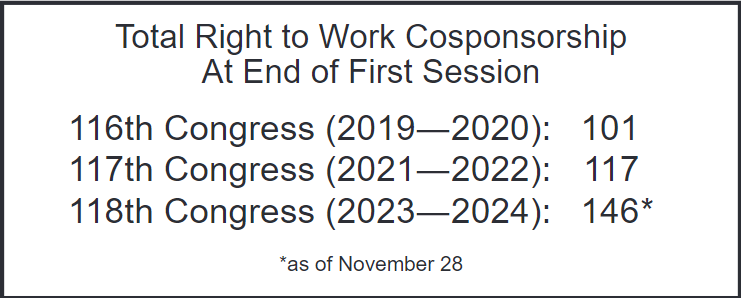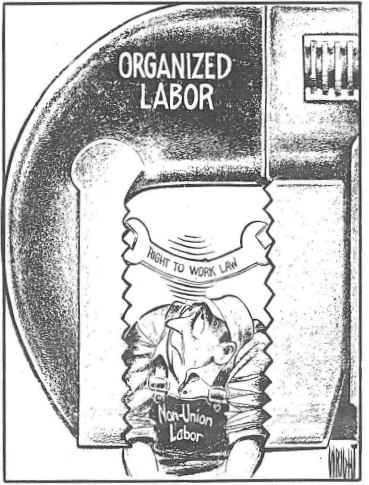Is This Any Way to Run a City’s Schools?
Leaked CTU Proposals Won’t Do Anything to Improve Schools’ Poor Performance

Continuous and increasing grassroots activism by National Right to Work Committee members and supporters, and face-to-face discussions with U.S. House of Representatives staff by Committee legislative personnel, have paid off.
On November 23, just six days before this Newsletter edition went to print, the House Employment and Workforce Committee publicly announced a hearing would be held on H.R.1200, the National Right to Work Act.
At press time, the hearing was set to take place on November 30 in Congressman Bob Good’s (R-Va.) Subcommittee on Health, Employment, Labor, and Pensions (HELP).
Committee President Mark Mix had accepted an invitation to testify, as had Brunilda Vargas and Jeanette Geary, two employees who are victims of compulsory unionism and clients of the Committee’s sister organization, the National Right to Work Legal Defense Foundation.
(A full account of the hearing is now slated to appear in the next Committee Newsletter.)
Chairman Good’s is the first congressional hearing on national Right to Work legislation since 1996, and the first- ever in the House.
Then-Committee President Reed Larson’s Senate testimony in favor of making union dues voluntary in March 1996 led to the first-in-history Senate floor vote on a national Right to Work law that July.
Following that roll call, 15 senators who voted to perpetuate forced unionism went on to be defeated for reelection, in a demonstration of the power of the Right to Work issue and the commitment of its activists.
In the current Congress, H.R.1200 and S.532, its Senate companion, already have a total of 146 cosponsors. In addition to recruiting cosponsors, Committee federal legislative staff continuously push for hearings and roll-call votes as a means of raising the public profile of the Right to Work issue and getting ever more politicians in Congress on record.
“This hearing is an exciting opportunity to make the case for Right to Work legislation,” said Mr. Mix.
“There are many labor-policy bills out there. But no other measure is as capable of engaging grassroots supporters as H.R.1200/S.532.
“This legislation forces politicians to answer a simple question: Should union dues be voluntary?
“Those who answer in the negative because they want union-boss campaign support will have a difficult time explaining their position to voters.”
Less than halfway through the 118th Congress, federal forced-dues repeal already has 115 cosponsors in the House alone.
That’s more support than was achieved in the entirety of either of the last two Congresses.
Mr. Mix testified at a Senate hearing on the impact of unionization in March 2023.
Just a few weeks later, Committee legislative staff helped secure an opportunity for Foundation attorney Aaron Solem to testify at a House hearing on anti-worker bias at union-label President Joe Biden’s National Labor Relations Board.
The Right to Work footprint on Capitol Hill is growing even as Big Labor politicians cheer on high-profile strikes and coercive union organizing drives.
For example, on November 14, Senate HELP Chairman Bernie Sanders (I-Vt.) invited United Autoworkers czar Shawn Fain to testify at a hearing so he could brag about the concessions supposedly extracted from GM, Ford and Stellantis through a strike launched in September.
What the militant union kingpin failed to acknowledge during the hearing was the highly political nature of the strike.
As former Congressman Mick Mulvaney noted in the Washington Examiner, pay increases of greater than 20%, inflation protections, and enhanced retirement benefits were already on the table before the strike began.
But Mr. Fain and his cabal of deputies associated with the far-left Democratic Socialists of America wanted a weeks-long strike anyway, because their primary aim was to pave the way for passage of radical legislation tightening the government’s grip over private enterprise and redistributing incomes.
This year, Capitol Hill champions of forced unionism can be expected to offer a similarly welcoming forum for International Longshoremen’s Association President Harold Daggett, who is already threatening to order roughly 65,000 ILA rank-and-file out on strike when their contract expires in nine months.
Mr. Daggett can count on the support of the Biden Administration and its Capitol Hill cronies despite the fact that he has been the subject of numerous federal investigations over his ties to Organized Crime. Mr. Daggett has specifically been accused of seeking to award a lucrative employee benefit contract to a mobbed-up company.
When it was publicly revealed that Ralph Gigante, nephew of the late mobster Vincent “Chin” Gigante, was receiving $400,000 in annual wages for fewer than 30 hours of longshore work a week, Mr. Daggett shrugged it off, saying that was “not a lot of money today.”
In contrast to the pro-forced unionism fables routinely promoted in the Senate HELP Committee by Mr. Sanders, the H.R.1200 hearing is focusing on individual workers, particularly those who choose to say no to forced unionism.
“Education and Workforce staff chose two excellent witnesses in attorney Brunilda Vargas and registered nurse Jeanette Geary,” said Mr. Mix. “Both were lied to and intimidated by union bosses regarding their union dues, problems they would not have had if they enjoyed Right to Work protections.”

Mr. Mix continued:
“Big Labor politicians don’t know what to do when they come face-to-face with workers who have been directly harmed by monopolistic unionism and are prepared to talk about it.
“It eviscerates the narrative that workers who oppose bankrolling a union don’t know what’s good for them.
“Now Ms. Vargas and Ms. Geary are getting the opportunity to expose the truth: Union bosses frequently bully workers, and their government-granted power to force workers to pay for ‘representation’ they don’t want and provides them no benefit is of great use to bullies.
“I am confident they will make a powerful case that all union dues should be voluntary and that Congress should pass H.R.1200/S.532 without further delay.”
This article was originally published in our monthly newsletter. Go here to access previous newsletter posts.
To support our cause and help end forced unionism, go here to donate.

Leaked CTU Proposals Won’t Do Anything to Improve Schools’ Poor Performance

Wherever Big Labor wields the power to collect forced union dues, union bosses funnel a large share of the confiscated money into efforts to elect and reelect business-bashing politicians. Employment growth tends to lag as a consequence.

Members Insist They Keep Pro-Right to Work Campaign Promises